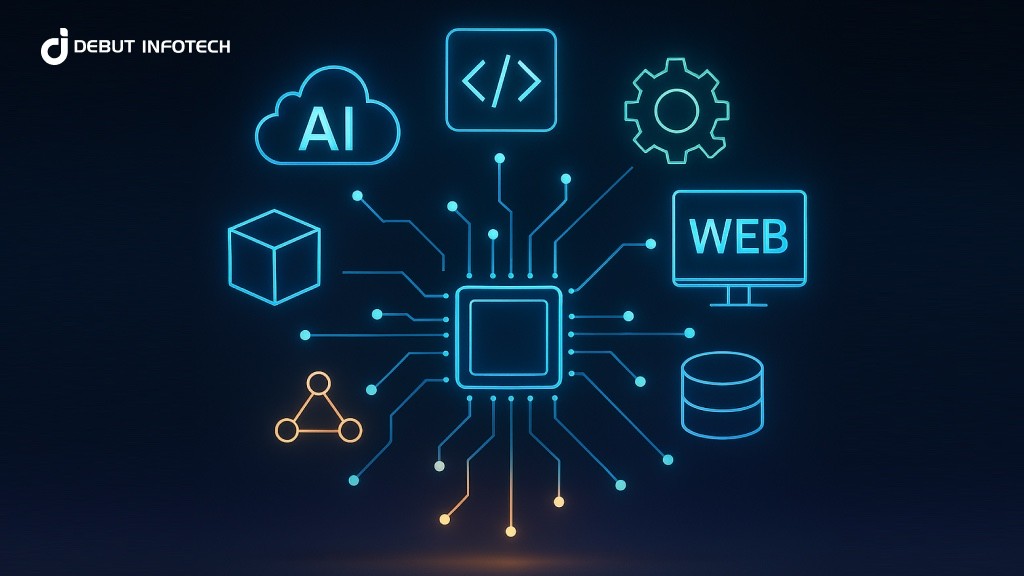Artificial Intelligence (AI) has transitioned from being a distant expectation to a central component of modern technology. Companies spanning different sectors have started implementing AI development services, not only to enhance workflow efficiency but also to reveal deeper business insights and provide highly tailored experiences to users. From healthcare’s predictive analysis, finance’s advanced fraud detection, to support’s AI-powered chatbot development, the efficacy of these endeavors is tethered to the foundational technology chosen. The AI tech stack’s selection transcends mere IT concerns, becoming a strategic priority that impacts performance, scalability, and ROI.
Consider the global competition for talent, the need for speed to market, and the multitude of performance improvements demanded by clients. Organisations that pick their tech stack for AI carefully earn distinct benefits. Enterprises need to assess software, frameworks, and foundational infrastructure that suit both present and coming AI applications, especially with the development of generative AI, LLMs, and AI Copilot tools. Much like Debut Infotech’s interventions, this write-up aims to guide firms on how to stay competitive, make intelligent considerations when constructing AI solutions. Additionally, you will learn about the necessary modern AI tech stack components, and identify the fundamental components of a contemporary AI tech stack.
Understanding the AI Tech Stack
An AI tech stack is a collection of all the necessary technology required to build an AI system. It allows businesses to model, train, deploy, and maintain AI models fueled by programming languages, frameworks, tools, and the necessary infrastructure. Just as developers use specific stacks for mobile and web applications, effective AI development services demands a particular set of tools optimized for data-centric tasks.
A well-structured AI tech stack diagram typically includes several layers:
- Data Processing & Storage: Tools like Apache Spark, Hadoop, and SQL/NoSQL databases handle massive datasets and prepare them for training.
- Machine Learning Frameworks: Platforms such as TensorFlow, PyTorch, and Scikit-learn enable AI model development for a wide range of AI use cases.
- Deployment & Monitoring: Technologies like Docker, Kubernetes, and MLflow ensure that AI models are deployed seamlessly and monitored for accuracy and performance.
- Security & Compliance: AI data security measures, including encryption and access control, protect sensitive information and maintain compliance with industry standards.
Ultimately, selecting the right combination of these components determines how scalable, reliable, and future-ready your AI systems will be.
Factors to Consider When Selecting the Tech Stack for AI
Choosing the right tech stack for AI goes beyond picking popular tools. Businesses must align technology choices with project goals, scalability needs, data availability, and long-term maintenance. The right foundation ensures efficient AI model development, smoother deployment, and adaptability to future innovations.
1. Type of AI Use Cases
The ideal AI tech stack depends largely on the application. For example, AI agents that automate customer support require natural language processing (NLP) tools, while predictive maintenance solutions rely heavily on time-series analysis. Similarly, AI Copilot development for enterprise workflows requires integration with productivity tools. Understanding the target AI use cases helps narrow down which tools and frameworks are most relevant.
2. Machine Learning (ML) and Model Requirements
Some projects may need deep learning with large-scale neural networks, while others may only require simpler AI algorithms. To create an advanced LLM model, frameworks like Hugging Face, OpenAI-compatible APIs, or PyTorch are vital. Businesses should assess whether they need pre-trained models, custom AI model development, or both.
3. Data Security and Compliance
AI thrives on data, but sensitive information must be protected. Strong AI data security protocols are critical, especially in industries like healthcare and banking. The tech stack should support encryption, anonymization, and compliance with regulations such as GDPR or HIPAA.
4. Scalability and Infrastructure
Cloud platforms like AWS, Google Cloud, and Azure are integral for modern AI. They provide scalable storage, GPU/TPU instances, and ML-specific services. When selecting the tech stack for AI, businesses must ensure it can handle growing data volumes, real-time inference, and large-scale deployments.
5. Integration With Existing Systems
Enterprises often need AI solutions that integrate with their existing ERP, CRM, or IoT ecosystems. Choosing AI tools that are flexible and API-friendly ensures seamless adoption without disrupting workflows.
Essential Components of an AI Tech Stack
An AI tech stack combines tools and technologies that power the entire AI lifecycle—from data collection to deployment and monitoring. Each layer ensures scalability, performance, and security for AI solutions.
- Programming Languages: Python is the most common for its simplicity and libraries, R supports statistical computing, while Java and C++ are preferred for performance-heavy applications.
- ML & AI Frameworks: TensorFlow and PyTorch lead in deep learning, Scikit-learn is reliable for traditional Machine Learning (ML), and specialized frameworks like Rasa or Dialogflow support chatbot and copilot development.
- Data Management Tools: Hadoop, Apache Spark, and SQL/NoSQL databases handle structured and unstructured data, ensuring large-scale processing and smooth access for AI models.
- Deployment Tools: Docker and Kubernetes enable scalable deployment across environments, while MLflow manages model tracking and versioning.
- Security & Monitoring: Tools for anomaly detection, access control, and model monitoring safeguard data, prevent bias, and ensure long-term reliability of AI systems.
The Role of Large Language Models (LLMs) in AI Tech Stacks
Large Language Models (LLMs) are transforming how enterprises implement AI. From customer support to content creation, LLMs power advanced AI agents that deliver human-like interactions. Choosing the right frameworks and infrastructure for the LLM model development is essential.
Many businesses turn to an LLM development company for expertise in fine-tuning models, integrating APIs, and managing resource-heavy deployments. This ensures better results while optimizing costs.
The Growing Importance of AI Copilot Development
AI Copilot development is rapidly becoming one of the most significant trends in Artificial Intelligence (AI). These intelligent copilots function as embedded digital assistants, seamlessly integrating into existing workflows to provide contextual recommendations, automate repetitive tasks, and help users make faster, more accurate decisions. By reducing cognitive load and decision fatigue, AI copilots enhance productivity across industries while also personalizing user experiences.
To deliver these capabilities, the underlying AI tech stack must be both flexible and powerful. It should include natural language processing (NLP) frameworks, real-time data processing systems, AI algorithms for contextual learning, and integration layers that connect smoothly with existing enterprise tools. The AI stack also needs strong AI data security measures to ensure sensitive information is protected while copilots interact with critical workflows.
AI copilots are being used in various sectors, including software engineering, healthcare, finance, and finance. They help developers optimize code, reduce debugging time, and accelerate project timelines. In healthcare, they provide diagnostic insights and treatment recommendations. In finance, they help analysts detect anomalies, forecast risks, and simplify compliance tasks. Building effective copilots requires skilled AI development companies, robust infrastructure, and a well-designed tech stack. Businesses investing in AI copilot development are positioning themselves ahead, leveraging AI to enhance human capabilities and create a competitive advantage.
Common Challenges in Building an AI Tech Stack
- Data Fragmentation: When data comes from multiple unstructured or disconnected sources, preparing quality datasets for training AI models becomes harder.
- High Costs: Building and maintaining infrastructure for AI model development, including GPUs and cloud resources, can demand significant financial investment.
- Talent Gaps: Many companies struggle to hire AI developers with specialized expertise in AI algorithms, ML, and LLM models.
- Rapid Evolution: The AI tech stack changes quickly with new frameworks, tools, and AI models, requiring teams to update their knowledge constantly.
Overcoming these challenges requires guidance from seasoned AI consulting firms and reliable AI development companies that understand both the technical and strategic aspects of building with AI.
How Debut Infotech Comes To Assist
Selecting and implementing the right AI tech stack can be overwhelming, especially for enterprises navigating the complexities of AI adoption. This is where Debut Infotech plays a vital role. As a leading provider of AI development services, Debut Infotech helps businesses design, build, and deploy AI solutions tailored to their unique needs.
Whether it’s AI model development, AI Chatbot development, or full-scale AI Copilot development, Debut Infotech brings deep expertise across frameworks, tools, and cloud platforms. The company also emphasizes AI data security, ensuring compliance and trust in sensitive industries. By choosing Debut Infotech, businesses gain a trusted partner capable of handling everything from AI consulting to deployment and scaling.
Conclusion
The success of any AI initiative depends on choosing the right tech stack for AI. Each layer plays a critical role in shaping performance and scalability, from programming languages and ML frameworks to security protocols and deployment tools. With trends like LLM model development and AI Copilot development gaining momentum, businesses need flexible, future-ready stacks that support evolving AI use cases.
Ultimately, partnering with experienced AI development companies like Debut Infotech ensures organizations can confidently navigate this complex landscape. By combining industry expertise, the latest artificial intelligence technology, and a focus on security, Debut Infotech empowers enterprises to unlock the full potential of AI. The right AI tech stack is not just about technology—it’s about enabling innovation, efficiency, and long-term growth.









